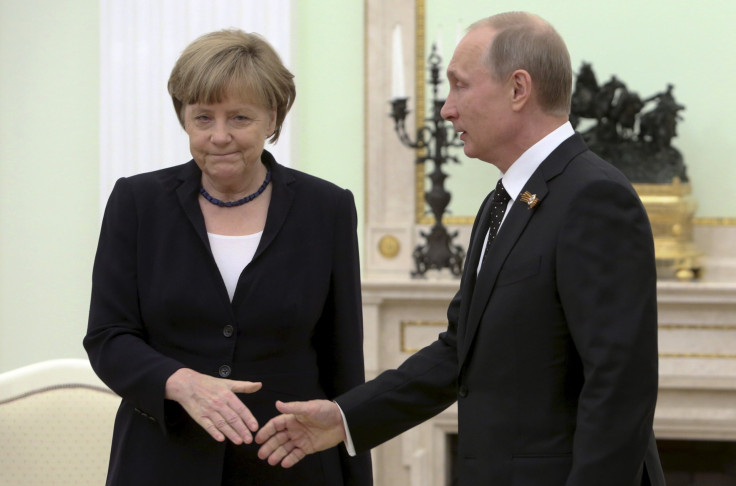Germany Wants To Lift Sanctions On Russia: Merkel Debates European Union Action To Promote 'Common Security'

German Chancellor Angela Merkel said Monday she has "the very greatest interest in stopping sanctions" against Russia in the latest sign that Moscow and Berlin are working to renew relations amid conflicts in Ukraine and Syria. Merkel said as long as pro-Russian fighters in Ukraine keep the peace, she is prepared to ask the European Union to immediately lift energy, financial and defense sanctions sanctions against Russia.
“As soon as we see progress in the Minsk agreement, we will loosen the sanctions,” Merkel said at an event in northeastern Germany on Monday evening, referring to the peace deal in Ukraine. But Merkel also noted that the the Minsk agreement signed in February 2015, which calls for the removal of heavy weaponry from the front line in eastern Ukraine, has constantly been violated by both sides.
The European Union brought sanctions against Russia after Moscow annexed Crimea from Ukraine in 2014. Germany Foreign Minister Frank-Walter Steinmeier has also called to end sanctions against Russia in recent days, urging a return to "a reliable understanding of common security," the Local reported.
Merkel recently defended the sanctions in an Aug. 19 interview with RedaktionsNetzwerks Deutschland. "Europe had to react against this violation of basic principles," Merkel said.
In June, European Union officials said they would extend the sanctions to the end of January 2017, the Wall Street Journal reported.
The sanctions have hurt Russia's economy, which has also suffered from tanking oil prices. With oil near $50, Moscow is running its widest budget deficit since 2010 and could see its economy grow less than 1 percent next year.
“Given the prolongation of EU sanctions into early 2017 and recent hawkish statements by German Chancellor Merkel, we see only a small chance of sanctions easing in a one-year horizon,” Andreas Schwabe, an economist at Raiffeisen Bank International AG in Vienna, told Bloomberg this week. “Moreover, for any easing of the Western sanctions, we see the requirement of Russia showing some flexibility in its position, which is currently not the case.”
© Copyright IBTimes 2025. All rights reserved.





















